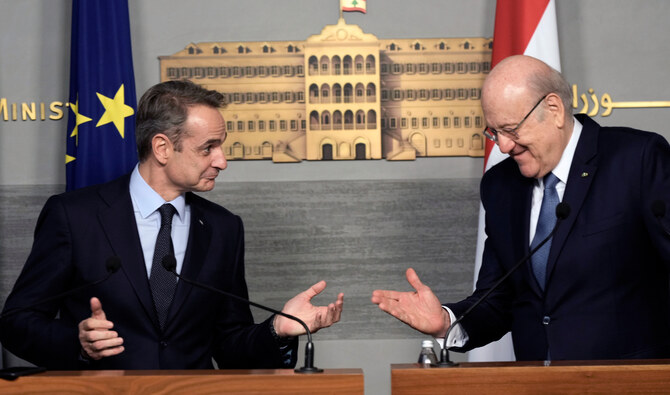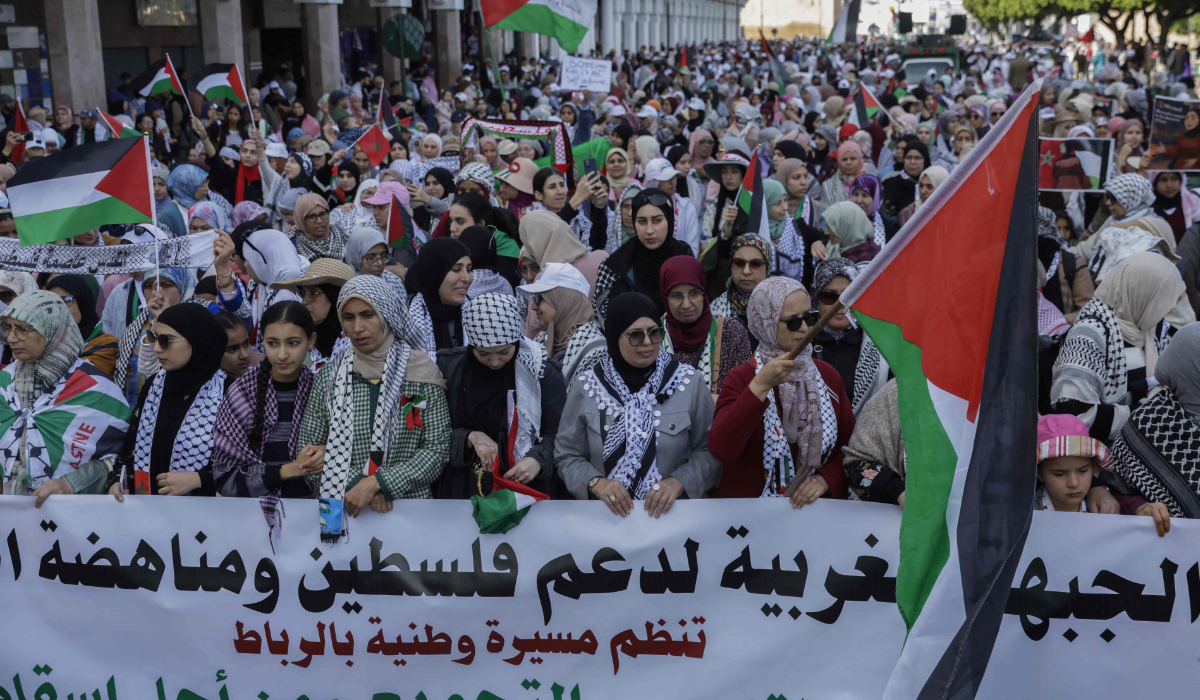BEIRUT: Greek Prime Minister Kyriakos Mitsotakis emphasized in Beirut on Monday that implementing the ceasefire agreement to halt hostilities between Israel and Lebanon is crucial for the well-being and stability of the region.
The visiting prime minister also said Greece “and the international community are taking all necessary measures to uphold the ceasefire in southern Lebanon and to implement UN Resolution 1701, which safeguards Lebanese sovereignty.”
His statement came as the Israeli military once again violated the ceasefire by launching a drone to target a valley in the towns of Musayleh and Najariyah in the Sidon district of southern Lebanon, resulting in three injuries, according to the Lebanese Health Ministry.
Mitsotakis met with Lebanese officials and welcomed the fall of the regime of former Syrian President Bashar Assad, stressing the importance of upholding human rights.
He said that the political process must encompass all groups and address all disparities and issues.
Mitsotakis expressed hope for “the return of millions of refugees to Syria with the stabilization of the country.”
The Israeli army, however, demolished homes in Naqoura following the incursion of its forces into the area with tanks.
An infantry unit conducted a sweep of Naqoura using heavy machine guns.
Israeli army spokesman Avichay Adraee reiterated a warning to Lebanese residents against returning to the border area where Israeli forces are present until further notice.
The Israeli army is expected to withdraw from the border area, which includes more than 50 towns, within 60 days from the commencement of the ceasefire that began 19 days ago.
Israeli forces continued to demolish homes and facilities, hindering the deployment of the Lebanese army, which entered the border town of Khiam in southern Lebanon.
In a meeting on Monday, a gathering of Lebanese Christians known as the Lady of the Mountain advanced the position that the region, including Lebanon, had entered a new era and that implementing the approved resolution on the cessation of hostilities is a crucial step toward building the state.
“The Lebanese people will no longer accept the coexistence of the Lebanese republic and illegitimate weapons,” the group said.
Meanwhile, areas hit by Israeli airstrikes in the south, the southern suburbs of Beirut, and the Baalbek-Hermel region are facing unrest as Lebanese authorities and Hezbollah are being blamed for delays in the reconstruction of destroyed infrastructure.
The Nabatieh Traders Association demanded compensation for the region’s workers and businesses.
The traders will hold a demonstration on Thursday in the city’s public square.
The association said a wide range of people were affected by the “Hezbollah-initiated war on the southern front, which escalated into an extensive and destructive Israeli war across various regions.”
Compensation for demolished and damaged homes, institutions, and agricultural lands represents one of the most urgent issues requiring attention, as estimated damages are significantly greater than those recorded following the 2006 war.
Damage assessment committees from Jihad Al-Bina — affiliated with Hezbollah — and the Council of South Lebanon, mandated by the Lebanese government, are surveying towns and villages in southern Lebanon to evaluate the extent of damage.
Those whose homes were destroyed entirely have received specific financial aid, including a rental allowance of $4,000 per year and a furniture allowance of $8,000.
However, Hezbollah is facing criticism for delaying the start of reconstruction efforts. Instead of taking immediate action, the party has requested that citizens with partially damaged homes repair them at their own expense. They can then submit invoices for compensation to Jihad Al-Bina, along with photographs documenting the damage.
During a meeting held in the south with engineers and surveyors, Jihad Al-Bina’s restoration coordinator, Hussein Kheir Al-Din, said that the initial compensation would cover repairs for glass, aluminum, solar panels, bricks, and exterior stones.
In far-eastern Lebanon, the town of Hermel has begun to bear the burden of new Syrian refugees who fled after the fall of Assad’s regime.
Hezbollah facilitated the entry of thousands of Syrians into Lebanon through illegal crossings, with many taking refuge in religious buildings.
Additionally, Lebanese families who had lived in Syria since Hezbollah’s involvement in the Syrian war in 2012 also returned.
In Beirut, senior official Hamid Al-Khafaf announced that he had visited several Syrian shelters in the Beqaa region, including those in Al-Qasr, Hermel, the Sayyida Khawla Shrine in Baalbek, and other centers in the Zahle district.
“We learned about their needs and listened to their problems. We have already addressed some of them and decided to provide food aid vouchers in the coming days,” he said.
Hezbollah MP Hassan Fadlallah commented: “We are facing a difficult period, but we know how to overcome it.
“Israel is exploiting the opportunity that the 60 days present to carry out attacks and assassinations.
“At this stage, we say there are state and international resolutions.
“We also tell those who used to talk about the ability to protect Lebanon without the resistance to try their luck in this regard,” he said.
The MP stressed that Hezbollah was following up on the issue of Israeli violations with the government for it to assume its role through the institutions, the army, UN peacekeeping force UNIFIL, and the monitoring committee.
“All concerned parties bear this responsibility. Efforts are being exerted, but without leading to the desired result. Israel is taking advantage of the tense situation and the state of worry,” he added.
“We are monitoring the events and how they will stabilize. We want Syria to remain united and for its people to determine its fate and safety without it being under US hegemony and Israeli occupation.”




























